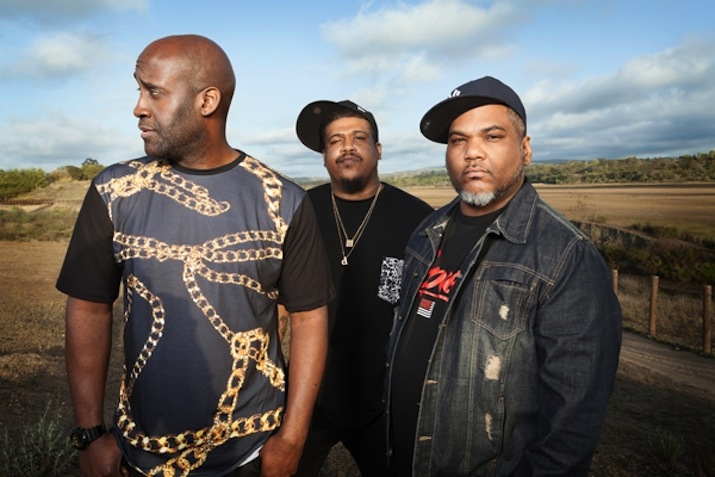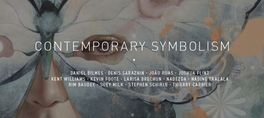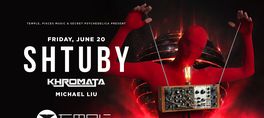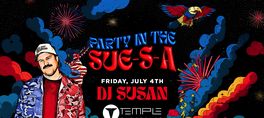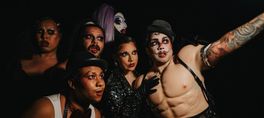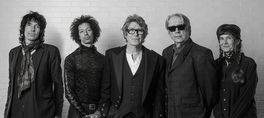Fri March 7, 2014
De La Soul
SEE EVENT DETAILS
at Former Yoshi's San Francisco Location - Now Closed
(see times)
At the time of its 1989 release, De La Soul's debut album, 3 Feet High and Rising, was hailed as the future of hip-hop. With its colorful, neo-psychedelic collage of samples and styles, plus the Long Island trio's low-key, clever rhymes and goofy humor, the album sounded like nothing else in hip hop.
Where most of their contemporaries drew directly from old-school rap, funk, or Public Enemy's dense sonic barrage, De La Soul were gentler and more eclectic, taking in not only funk and soul, but also pop, jazz, reggae, and psychedelia. Though their style initially earned both critical raves and strong sales, De La Soul found it hard to sustain their commercial momentum in the '90s as their alternative rap was sidetracked by the popularity of considerably harder-edged gangsta rap.
De La Soul formed while the trio — Posdnuos (born Kelvin Mercer, August 17, 1969), Trugoy the Dove (born David Jude Jolicoeur, September 21, 1968), and Pasemaster Mase (born Vincent Mason, March 27, 1970) — were attending high school in the late '80s. The stage names of all of the members derived from in-jokes: Posdnuos was an inversion of Mercer's DJ name, Sound-Sop; Trugoy was an inversion of Jolicoeur's favorite food, yogurt. De La Soul's demo tape, "Plug Tunin'," came to the attention of Prince Paul, the leader and producer of the New York rap outfit Stetsasonic. Prince Paul played the tape to several colleagues and helped the trio land a contract with Tommy Boy Records.
Prince Paul produced De La Soul's debut album, 3 Feet High and Rising, which was released in the spring of 1989. Several critics and observers labeled the group as a neo-hippie band because the record praised peace and love as well as proclaiming the dawning of "the D.A.I.S.Y. age" (Da Inner Sound, Y'all). Though the trio was uncomfortable with the hippie label, there was no denying that the humor and eclecticism presented an alternative to the hardcore rap that dominated hip-hop. De La Soul quickly were perceived as the leaders of a contingent of New York-based alternative rappers which also included A Tribe Called Quest, Queen Latifah, the Jungle Brothers, and Monie Love; all of these artists dubbed themselves the Native Tongues posse.
show less
Where most of their contemporaries drew directly from old-school rap, funk, or Public Enemy's dense sonic barrage, De La Soul were gentler and more eclectic, taking in not only funk and soul, but also pop, jazz, reggae, and psychedelia. Though their style initially earned both critical raves and strong sales, De La Soul found it hard to sustain their commercial momentum in the '90s as their alternative rap was sidetracked by the popularity of considerably harder-edged gangsta rap.
De La Soul formed while the trio — Posdnuos (born Kelvin Mercer, August 17, 1969), Trugoy the Dove (born David Jude Jolicoeur, September 21, 1968), and Pasemaster Mase (born Vincent Mason, March 27, 1970) — were attending high school in the late '80s. The stage names of all of the members derived from in-jokes: Posdnuos was an inversion of Mercer's DJ name, Sound-Sop; Trugoy was an inversion of Jolicoeur's favorite food, yogurt. De La Soul's demo tape, "Plug Tunin'," came to the attention of Prince Paul, the leader and producer of the New York rap outfit Stetsasonic. Prince Paul played the tape to several colleagues and helped the trio land a contract with Tommy Boy Records.
Prince Paul produced De La Soul's debut album, 3 Feet High and Rising, which was released in the spring of 1989. Several critics and observers labeled the group as a neo-hippie band because the record praised peace and love as well as proclaiming the dawning of "the D.A.I.S.Y. age" (Da Inner Sound, Y'all). Though the trio was uncomfortable with the hippie label, there was no denying that the humor and eclecticism presented an alternative to the hardcore rap that dominated hip-hop. De La Soul quickly were perceived as the leaders of a contingent of New York-based alternative rappers which also included A Tribe Called Quest, Queen Latifah, the Jungle Brothers, and Monie Love; all of these artists dubbed themselves the Native Tongues posse.
At the time of its 1989 release, De La Soul's debut album, 3 Feet High and Rising, was hailed as the future of hip-hop. With its colorful, neo-psychedelic collage of samples and styles, plus the Long Island trio's low-key, clever rhymes and goofy humor, the album sounded like nothing else in hip hop.
Where most of their contemporaries drew directly from old-school rap, funk, or Public Enemy's dense sonic barrage, De La Soul were gentler and more eclectic, taking in not only funk and soul, but also pop, jazz, reggae, and psychedelia. Though their style initially earned both critical raves and strong sales, De La Soul found it hard to sustain their commercial momentum in the '90s as their alternative rap was sidetracked by the popularity of considerably harder-edged gangsta rap.
De La Soul formed while the trio — Posdnuos (born Kelvin Mercer, August 17, 1969), Trugoy the Dove (born David Jude Jolicoeur, September 21, 1968), and Pasemaster Mase (born Vincent Mason, March 27, 1970) — were attending high school in the late '80s. The stage names of all of the members derived from in-jokes: Posdnuos was an inversion of Mercer's DJ name, Sound-Sop; Trugoy was an inversion of Jolicoeur's favorite food, yogurt. De La Soul's demo tape, "Plug Tunin'," came to the attention of Prince Paul, the leader and producer of the New York rap outfit Stetsasonic. Prince Paul played the tape to several colleagues and helped the trio land a contract with Tommy Boy Records.
Prince Paul produced De La Soul's debut album, 3 Feet High and Rising, which was released in the spring of 1989. Several critics and observers labeled the group as a neo-hippie band because the record praised peace and love as well as proclaiming the dawning of "the D.A.I.S.Y. age" (Da Inner Sound, Y'all). Though the trio was uncomfortable with the hippie label, there was no denying that the humor and eclecticism presented an alternative to the hardcore rap that dominated hip-hop. De La Soul quickly were perceived as the leaders of a contingent of New York-based alternative rappers which also included A Tribe Called Quest, Queen Latifah, the Jungle Brothers, and Monie Love; all of these artists dubbed themselves the Native Tongues posse.
read more
Where most of their contemporaries drew directly from old-school rap, funk, or Public Enemy's dense sonic barrage, De La Soul were gentler and more eclectic, taking in not only funk and soul, but also pop, jazz, reggae, and psychedelia. Though their style initially earned both critical raves and strong sales, De La Soul found it hard to sustain their commercial momentum in the '90s as their alternative rap was sidetracked by the popularity of considerably harder-edged gangsta rap.
De La Soul formed while the trio — Posdnuos (born Kelvin Mercer, August 17, 1969), Trugoy the Dove (born David Jude Jolicoeur, September 21, 1968), and Pasemaster Mase (born Vincent Mason, March 27, 1970) — were attending high school in the late '80s. The stage names of all of the members derived from in-jokes: Posdnuos was an inversion of Mercer's DJ name, Sound-Sop; Trugoy was an inversion of Jolicoeur's favorite food, yogurt. De La Soul's demo tape, "Plug Tunin'," came to the attention of Prince Paul, the leader and producer of the New York rap outfit Stetsasonic. Prince Paul played the tape to several colleagues and helped the trio land a contract with Tommy Boy Records.
Prince Paul produced De La Soul's debut album, 3 Feet High and Rising, which was released in the spring of 1989. Several critics and observers labeled the group as a neo-hippie band because the record praised peace and love as well as proclaiming the dawning of "the D.A.I.S.Y. age" (Da Inner Sound, Y'all). Though the trio was uncomfortable with the hippie label, there was no denying that the humor and eclecticism presented an alternative to the hardcore rap that dominated hip-hop. De La Soul quickly were perceived as the leaders of a contingent of New York-based alternative rappers which also included A Tribe Called Quest, Queen Latifah, the Jungle Brothers, and Monie Love; all of these artists dubbed themselves the Native Tongues posse.
show less
Date/Times:
Former Yoshi's San Francisco Location - Now Closed
1330 Fillmore Street, San Francisco, CA 94115
The Best Events
Every Week in Your Inbox
From Our Sponsors
UPCOMING EVENTS
Great suggestion! We'll be in touch.
Event reviewed successfully.
